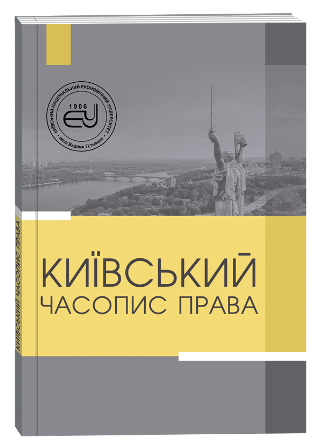ДЕРЖАВНЕ РЕГУЛЮВАННЯ ПРОЦЕДУР МІСТОБУДІВНОЇ ДІЯЛЬНОСТІ: НАЦІОНАЛЬНИЙ ТА ЗАРУБІЖНИЙ ДОСВІД
DOI:
https://doi.org/10.32782/klj/2025.1.12Ключові слова:
містобудівна діяльність, державне регулювання, просторове планування, будівельні норми, дозвільні процедури, екологічні стандарти, громадська участь, діджиталізація, міжнародний досвід, містобудівний контроль, законодавство України, муніципальне управління, зонування, сталий розвитокАнотація
Ця стаття присвячена дослідженню державного регулювання процедур містобудівної діяльності. Міське планування є важливою складовою державного управління і безпосередньо впливає на просторовий розвиток, економіку, екологічну безпеку та якість життя регіону. В Україні цей сектор регулюється широкою нормативно-правовою базою, зокрема Законом України «Про регулювання містобудівної діяльності», але її застосування стикається з низкою проблем, зокрема застарілість або фрагментарність законодавства, що ускладнює його застосування та створює правову невизначеність, недостатня ефективність механізмів нагляду, бюрократизацією процедур, недостатньою цифровізацією та слабкою інтеграцією міжнародного досвіду. Це призводить до низької ефективності державного регулювання, збільшення корупційних ризиків та гальмування розвитку містобудівних проєктів. Вивчення досвіду регулювання містобудівної діяльності в інших країнах, зокрема в Німеччині, Франції, Великобританії та США, показує, що ефективне управління сектором можливе завдяки чіткому правовому регулюванню, децентралізації повноважень, впровадженню цифрових технологій та активній участі громадян у цьому процесі. Досвід інших країн показує, що існують різні підходи до регулювання просторового планування, процедур отримання дозволів на будівництво, контролю за дотриманням містобудівного законодавства та забезпечення сталого розвитку міських територій. У цій статті проаналізовано тенденції державного регулювання містобудівної діяльності в Україні та зарубіжний досвід, проведено порівняльний аналіз з міжнародним досвідом. Особлива увага приділяється рішенням у сфері децентралізації, громадської участі, екологічних стандартів та міського планування, аналіз яких спрямований на підвищення ефективності управління, забезпечення сталого розвитку регіону та створення сприятливого міського середовища.
Посилання
Дурман М. О., Микитюк Д. М. Деякі аспекти формування державної регуляторної політики у сфері будівництва та архітектури. Вісник Херсонського національного технічного університету. 2022. № 1. С. 85–93. URL: https://doi.org/10.35546/kntu2078-4481.2022.1.10.
Курчин О. Г., Kurchyn O. H. Конституційно-правове забезпечення органами місцевого самоврядування містобудівної діяльності: проблеми теорії та практики : thesis. 2020. URL: https://er.nau.edu.ua/ handle/NAU/44665.
БЕВЗЕНКО В. Публічне будівельне право України: від доктрини до практичного втілення через європейський досвід. Право України. 2023. № 2023/02. С. 33. URL: https://doi.org/10.33498/louu-2023-02-033.
Anatoliy Kostruba. Особливості правового регулювання житлових відносин у Франції. Правові засади як основа регламентації та регулювання житлових відносин в умовах воєнного часу, Research Institute of Private Law and Entrepreneurship named after Academician F. G. Burchak of the National Academy of Sciences of Ukraine, May 2023, Kyiv, Ukraine. pp.25-30. hal-04172638
Про місцеве самоврядування в Україні : Закон України від 21.05.1997 № 280/97-ВР : станом на 8 січ. 2025 р. URL: https://zakon.rada.gov.ua/laws/show/280/97-вр#Text.
Benchmarking Case Studies on Planning Laws in Five Countries: Morocco, Netherlands, South Africa, Republic of Korea, and The United Kingdom of Great Britain and Northern Ireland. Nairobi : UN-Habitat, 2023. 249 p. URL: https://urbanpolicyplatform.org/wp-content/uploads/2023/11/Benchmarking-case-studies.pdf.
Barr J. M. Building the Skyline: The Birth and Growth of Manhattan’s Skylines. Oxford University Press, Incorporated, 2018. 456 p.







